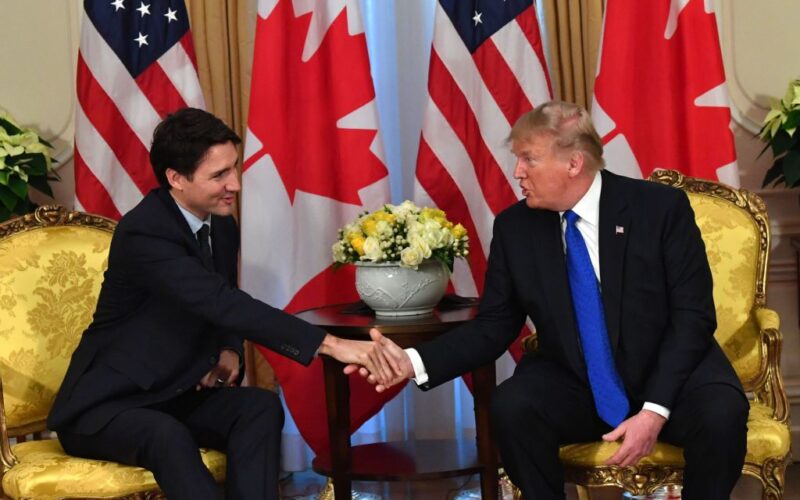In June of 1999, Trey Parker and Matt Stone’s vulgar and hilarious animated series “South Park” came to the silver screen.
“South Park: Bigger, Longer & Uncut” followed Stan, Kyle, Cartman and Kenny as they sneak into the R-rated film “Asses of Fire” starring fictional Canadian comedy duo “Terrance and Phillip.” When they begin swearing like their heroes in the movie, a moral panic sweeps the town, and eventually ends with the U.S. declaring war on Canada.
The clever and sidesplitting song “Blame Canada” was the film’s breakout moment — it was even nominated for an Academy Award for Best Original Song at the 72nd Oscars.
As merciless as the attacks on our neighbors to the north were, few took actual offense. That’s because the U.S. and Canada were longtime allies, partners, friends — the only reason the conceit worked was because the idea of America turning on Canada was so absurd.
My, how times have changed.
I was on Instagram earlier this week when an ad for Canadian-American actor Ryan Reynolds’ Aviation American Gin popped up. The comments from Canadians were brutal. (Well, brutal by Canadian standards.)
From Marions.Paintings: “While I/we [Canadian flag emoji] all love you Ryan, not buying American. They are bullying us. We are standing up, elbows up and buying [Canadian flag emoji.]”
From JessicaSawers: “When rump leaves and we can have American booze in Canada again I will get some!”
From Ibbocanada: “You need to lose the American gin and make a Canadian one eh.”
It’s jarring and terribly sad to hear our longtime friends talk about us this way. But who could blame them?
While they were minding their own business — a beloved and time-honored Canadian pastime — Donald Trump inexplicably and suddenly decided to make enemies of our allies.
At a November dinner at Mar-A-Lago when Trump was president-elect, he reportedly joked with then Canadian Prime Minister Justin Trudeau about annexing Canada, but Canadian officials brushed it off.
As Trump began repeating the line publicly, with increased sincerity and decreased humor, it began to rattle cages, and things only got worse.
In a January news conference, Trump said he might use “economic force” to acquire the sovereign nation.
In a February call with Trudeau, Trump told him he didn’t believe that the 1908 treaty demarcating our borders was valid and was considering revising the boundary.
The administration reportedly started discussing removing Canada from a crucial intelligence sharing alliance.
Trump started referring to Canada on television and in social media as “the 51st state” and demeaned Trudeau as its “governor.”
He talked about tearing up the Great Lakes agreements that govern how we share bordering waterways.
He even began reviewing whether the U.S. would continue military cooperation between the two countries.
Finally, there were the tariffs.
In February, a 25% tariff on steel and aluminum products. That rate doubled to 50% in June.
In April, a 25% tariff on auto imports.
In July, a 10% increase on Canadian goods dubbed the “Fentanyl” tariff, a punishment for Canada’s alleged failure to curb drug trafficking at the border.
In August, a 50% tariff on semi-finished copper products.
Canada responded with its own retaliatory tariffs against Americans.
As any economist not being paid by the Trump administration will tell you, no one wins a trade war, and the people impacted most are tax payers and consumers, who end up having to pay the higher prices passed down from tariffed goods.
But the volatility between our two nations has had other deleterious consequences for our economy.
A new report from NPR’s Joe Hernandez reveals the historic and significant toll this unjustified feud is having on tourism.
Paul Dame owns a golf resort in Plattsburgh, N.Y., which would typically draw a good amount of summer visitors from Quebec or Ontario. Not anymore. “It’s tough, because we’ve developed this relationship with the cross-border economy,” Dane says. “And now here we are, the rug getting pulled out from underneath us.”
Canadian residents made just 1.7 million return trips by car from the U.S. in July, a whopping 37% drop from the same time last year, according to Statistics Canada. According to U.S. data, Canadians made a bit more than 7 million visits to the U.S. between January and May, a 17% decrease.
In 2024, Canada was the top source of international tourists in America, visits which generated $20.5 billion in spending and supported 140,000 US jobs.
Apparently, that’s revenue and jobs Trump believes we can live without. But Americans don’t feel the same way about Canada as he does. A majority has positive views of our neighbors — views they used to reciprocate.
Now, according to a Pew poll from July, two-thirds of Canadians have an unfavorable view of America.
Not just Trump, but America.
That’s absolutely heartbreaking.








